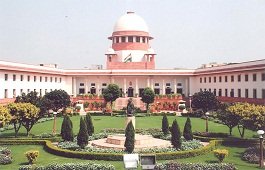[ad_1]
The year 2019 had been one filled with controversy (religiously/politically/socially). Though the matters included in the cases before the Supreme Court were controversial in nature, the pronouncements made in them seemed to have dampened the fire in those controversies. We only selected three of them which can be rightly enlisted in the segments: Religious/ Political/ Social.
1) Ayodhya case
M.Siddiq (D) Thr Lrs vs Mahant Suresh Das & Ors (Civil Appeal Nos: 10866-10867 of 2010
Decades-old Ayodhya land title dispute came to an end in November.
The important observations of the Supreme Court are as follows:
Babri Masjid was not built in an empty place. The Court affirmed the report of the Archeological Survey of India which says that there were remains of a temple below the place where the mosque was demolished. But this does not mean that the temple was demolished to construct the mosque. It is evident that Lord Rama was born at the disputed place. However, the Sunni Wakf board failed to prove the title to the property. The Supreme Court recognized the deity, Ram Lalla, as a legal entity and gave it the title to the disputed 2.77 acres landed property. The judgment was unanimous by the five-judge bench. As per the judgment, the Central Government is supposed to set up a temple trust which will manage the landed property. The power of the trust will include the management of the property, construction of Ram temple in Ayodhya. Trust owns land outside the disputed land. The Central Government should give the land in its possession to the trust. Till the time of the formation of the trust, the receiver under the Government must hold the land. Nirmohi Akhada has to be given suitable representation in the Trust.
The Sunni Waqf Board was given 5 acres of land for construction of a Mosque. Either the Central Government or State Government has to give suitable property in an important place to the Board to build the mosque.
2) Rafale case
The issue was an attacking sword for the opposition party against the ruling Government in the Centre. The story kickstarted when a private concern Reliance Defence Limited was given opportunity to grab a whopping 1.30 lakh crore rupees bypassing public concern Hindustan Aeronautics Limited to manufacture war jets. Judgment in the Rafale case was pronounced on December 14, 2018. Later several review petitions were filed against the said judgment. A contempt case was filed against Rahul Gandhi. However, the apex court dismissed the review petitions and contempt charges against Mr.Rahul Gandhi was also ended. As a result, there is no more probe into the Rafale jets deal.
3) CJI is a public authority under RTI
Five-judge Constitution bench has declared that CJI is a public authority under RTI. But the apex court cautioned that the tool shall not be used as one for surveillance which will affect the smooth functioning and independence of the judiciary. Right of Privacy and Transparency are two important aspects which should be balanced. By this judgment, the apex court has upheld the ruling of Delhi High Court in 2010 which affirmed that the CJI is a public authority under RTI. In that case, the stand of the Supreme Court was against disclosure of information. The same stand is now reversed with this judgment.
The top Court stated that judicial independence is a vital element in the administration of justice but it should not be free from public scrutiny.
[ad_2]
Source link


